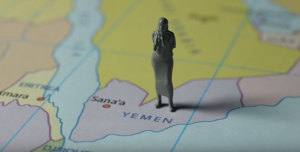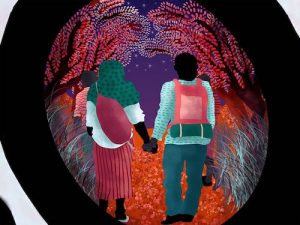Teaching Migration Through Data And Storytelling is a free online teacher CPD course launching on 26th October 2020, brought to you by the UKRI GCRF South-South Migration, Inequality and Development Hub (MIDEQ), SOAS, PositiveNegatives and Oaklands School. It’s funded by the UK Research and Innovation (UKRI) Global Challenges Research Fund (GCRF).

There have been urgent recent calls for curricula to address issues of race and migration. Yet 78% of British teachers asked by the Runnymede Trust said they needed more support “to equip them to teach migration more sensitively and effectively.” On this course, teachers can develop their skills to explain where and why migration happens, learn how to interpret big data sets, examine migration research through video and learning activities, and explore creative methods of storytelling, visual arts, and design to humanise migrant stories through the arts and empathic learning.

The course brings together teachers from around the world with researchers and creative practitioners from the UK’s largest academic research project on migration (MIDEQ).
From the creators of the award-winning Maths of Migration learning resources and teacher CPD, the course aims are:
- Developing teachers’ capacities and skills to access big data sets and contemporary research by providing the guidance, tools, and experience through video and learning activities delivered online
- Sharing and shaping understanding of the role of creative methods of storytelling, visual arts, and design to humanise migrant stories through creative and empathic learning
- Exploring the combined importance of both data-led evidence and arts to tackle global challenges such as migration, inequality, and development
- Equipping learners with critical thinking, data skills, independent investigation, and understanding reliability of sources
About the course:
What will you achieve?
By the end of the course, you‘ll be able to…
- Investigate why migration happens
- Explain where migration happens
- Explore ways of introducing large data on migration to learners
- Explore how using infographics will support learners to critically engage with data
- Explore how you can support students to access a large data set
Who is the course for?
This course is designed for teachers educators who want to know how to teach migration using data and storytelling. It would also appeal to anyone learning from home interested in these issues, or educators and learners interested in critical thinking, data skills, independent investigation, and understanding the reliability of sources.
Who will you learn with?
Jessica Barnecutt, Assistant Head at a secondary school in London
Jessica Barnecutt is a former Head of Maths at Oaklands School , a high performing, inner-London comprehensive. Now Assistant Head, Jessica’s doctoral research at IOE explores project based learning in mathematics, including how students can use maths to explore authentic situations.
Dr Gameli Tordzo, Researcher, MIDEQ
‘I am an artist in Residence of the UNESCO Chair on Refugee Integration Through Languages and The Arts (UNESCO RILA), based in the School of Education at the University of Glasgow. My research is in creative arts and translating cultures, language and education with a focus on African diaspora music, video film production, story and storytelling. My academic and professional background is in teaching, theatre for development education, traditional African music and film directing. I am also the founder, composer and Creative Director of Ha Orchestra and the AdinkraLinks Poetry Network.’
Dr Dereje Feyissa, MIDEQ Co-Investigator, Addis Abba
Dereje Feyissa is an eminent Ethiopian scholar with a regional focus on the Horn of Africa. He holds a doctorate in Social Anthropology from Martin-Luther University, Halle, Germany. He has extensive experience as a Research Fellow at Osaka University in Japan; at the Max Planck Institute for Social Anthropology and the Alexander von Humboldt in Germany.
Dr Anita Ghimire, MIDEQ Co-Investigator, Nepal
Anita is a teacher with a PhD in Human and Natural Resource Studies from University of Zurich and Kathmandu University and a 4-year Post Doctoral Degree from the University of Bern. She is a research director at the Nepal Institute for Social and Environmental Research.
Professor Heaven Crawley, Director of MIDEQ
Professor Heaven Crawley, is Director of MIDEQ and has nearly 30 years’ experience of undertaking research on international migration in a wide range of institutional settings (government, voluntary sector, national and international organisations, academia). Based at the Centre for Trust, Peace and Social Relations at Coventry University, Heaven’s research is underpinned by concerns about the inequalities with which international migration is associated and understanding the relationships between migration and inequality in the context of the Global South.
To register or for more information please visit Teaching Migration Through Data And Storytelling
MIDEQ is funded by:


